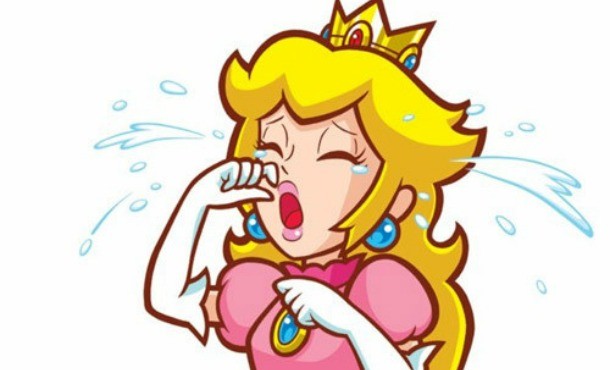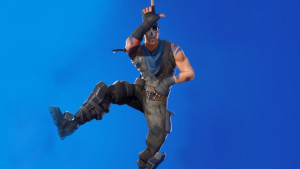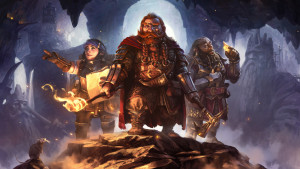Please support Game Informer. Print magazine subscriptions are less than $2 per issue
Opinion: Video Game Heroes Need A Greater Range Of Emotion

How many video game character have you ever seen cry? Video game characters often express powerful emotions, but they're usually shaking their fists at the heavens, not wiping tears from their cheeks. In fact, many gamers can probably count number of times they've seen a video game character cry on one of the Simpson's hands. Our industry's misuse of emotion fails to utilize some of the most powerful dramatic tools.
As a social experiment, I polled the Game Informer offices to see how many video game characters we could remember who had teared up in a game. The list we put together was revealing. Princess Peach in Super Princess Peach for the DS cries as part of the gameplay, causing her to run faster and make plants grow. Booker Dewitt makes Elizabeth cry after she finds out he is taking her to New York instead of Paris. The baby Goron from Goron Village in Major's Mask does nothing but cry until you put him to sleep. Yuna from Final Fantasy X cries in the Macalania Woods spring because she believes she can't escape her destiny as a sacrifice to Sin. Jodie from Beyond: Two Souls seemed to cry through the whole game. Isaac from The Binding of Isaac uses tears to fight enemies as well.
Look back at that list. The vast majority of the characters we thought of were either babies or women. What does that say about our male heroes? Our role models? Why don't more men cry in video games? This discrepancy seems even more egregious when you think about the fact that 99 percent of protagonists in video games are men. To be fair, we also thought of a few male characters who cry as well. For example, Otacon cries after his sister dies in Metal Gear Solid 2. But even though some games are flirting with real drama, most of the market still thinks crying is for Baby Marios.
The fact that most men in games don't cry is a symptom of a larger issue. Think about a lot of the big franchises from the last console generation: Grand Theft Auto, Metal Gear Solid, Halo, Gears of War, Dead Space, Crysis, Call of Duty, Infamous, Devil May Cry, God of War, Splinter Cell, Resident Evil, Hitman, Darksiders, Resistance, Bulletstorm, Saints Row, Just Cause, Sleeping Dogs, Castlevania: Lords of Shadow. Most heroes from these titles are great at expressing emotion, but they only express one emotion: anger.
To be fair, many of these game's aren't aiming for a powerful, dramatic narrative; they're a string of big action setpieces. In essence, they're Die Hard. And some of them are incredibly good at what they do, but what if every movie every made was trying to be Die Hard? What if there were no Schindler's Lists, or Eternal Sunshine of the Spotless Minds, or No Country for Old Mens? You would think that the movie industry was imbalanced. I believe that that is how our video game industry looks today; it's lopsided.
To be clear, I don't think that any of the game series listed above are inherently bad because their protagonists are emotionally stunted. In fact, I think the stoic hero can be used to great effect as seen in Red Dead Redemption. Other games, such as Mass Effect and Uncharted, do a great job of rounding out their hero's personalities and making them feel like real people even if they don't get super emotional. I just want to see this trend expanded upon. When you look at the larger list of video game heroes, it's clear that most of our protagonists are just different shades of Batman. I love Batman, and I'm not saying that all our video game heroes need to be weepy willows, but shouldn't there be room for heroes of a different ilk in our art?
One of the reason many protagonists don't cry is that we all want to be these kinds of capable heroes. Dealing with raw painful emotions isn't fun in real life, and the general thought is that tears make strong people look weak. Furthermore, if strong emotional scenes are done poorly, crying can comes across as laughable instead of somber. Still, these reasons shouldn't scare our industry away from exploring emotionally wrought heroes; our industry just needs to step up its game an utilize its characters' full spectrum of emotion.
I was reminded of just how powerful these kinds of emotionally charged scenes can be while playing Naughty Dog's The Last of Us last year. The opening scene of that game is an emotionally chaotic roller coaster where Joel and his daughter scramble to escape their home town the night that the cordyceps fungus turns most of its population into flesh eating mushrooms. Not only was this sequence thrilling, but it ended with the emotional stinger of Joel holding his daughter in his arms as she died. I'm not ashamed to say that as Joel deteriorated into a sobbing wreck, I began to tear up myself. These kinds of emotional moments are powerful, but they are moments our industry uses far too infrequently. Did crying make Joel less of a man? Did his tears make him look weak? In fact, they did the opposite; they amplified his lifelike persona and helped endear him to players.
While games like The Last of Us have started to explore deeper emotional issues than games of a decade before, I think our industry still has a mountain of untapped emotion left to explore. If our industry is going to grow, more of our heroes need to be willing to cry.










